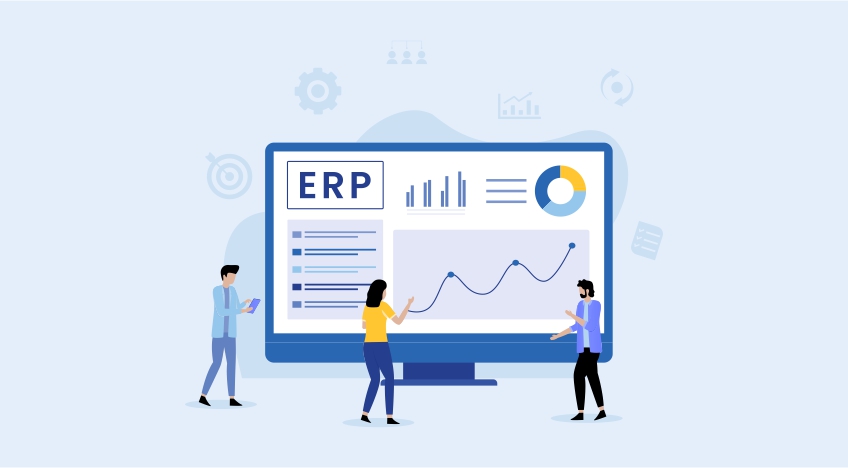5 Key Benefits of ERP for Accounting and Financial Management

Enterprise resource planning or ERP is a business management software that focuses on the business processes aspect. ERP is used to manage day-to-day tasks and processes of businesses of every size. ERP software helps manage a myriad of processes including supply chain operations, risk management, procurement, compliance, human resource activities, and accounting. ERP isn’t just an ordinary management software as it also improves business growth by combining data across different processes and providing thorough insights. These insights enable you to improve your business processes which means your business efficiency will increase over time.
Benefits of ERP for accounting and financial management
ERP is beneficial to your entire business. Let us see how exactly it is beneficial to accounting and financial management.
Gives complete control over data access
Data access is a crucial aspect of any system. You want your financial team to have easy access to the financial parts. But you might have sensitive information stored in your systems which should be accessed by only a few employees in your business and not others even in the same department. When systems are all over the place, it becomes difficult to control who gets access to what. Controlling and managing becomes a herculean task while taking up a lot of time as well. ERP software eases this burden by giving the control in your hands. You get to decide who gets access to what. You can change the access permissions when you need to.
Providing user access and easily managing it is one of the benefits of ERP. You get to edit the portions you wish to and manage it as you deem convenient for your business. You can allow someone else to co-author at certain times and then revoke the access when they no longer need access to that portion of business financials. You can get instant access and manage the user permission just as quickly with ERP. User access becomes an issue when you have hundreds of employees working and they are all getting information from the ERP system. ERP ensures thorough security. ERP comprehensively organizes data and so data retrieval is fast.
Unifies and integrates all financial data
One of the main benefits of ERP is its ability to integrate all financial data with complete accuracy. Manual entry of financial transactions and data can lead to errors which can cause calculation mistakes further down the line. ERP eliminates this by integrating financial information from various systems and ensuring there is a single data repository from which you can work. That is, ERP brings all data together so everyone is looking at the same data and working with that. This minimizes errors, decreases chances of duplicate entries in the system, and ensures correct data is being utilized in accounting. The basis of accounting is accurate and precise data. ERP provides financial managers with exactly that.
ERP software makes it faster for financial managers to do their job because they don’t need to be looking at different systems. Instead, they have a single unified system in front of them so they can use that data to perform financial processes. This cuts down on time spent looking for data and putting it together. This means financial managers can work faster and utilize the time to think of solutions as to how to increase savings. Financial managers have lots of tasks in their hands and the ERP system empowers them to focus on what matters rather than waste time looking for data. This reduces costs over time for the business.
Tracking capabilities for better management
One of the benefits of ERP is its ability to make payment and billing management efficient. ERP comes with excellent tracking features so you know when a payment is not made on time. This allows you to follow up to ensure timely payment either from customers or from other individuals such as vendors. ERP that is integrated with CRM enables businesses to automate and ensure proper reminders are set. This increases proper workflow across the entire system and therefore accuracy is always maintained. It also makes revenue and billing management simpler.
Report generation provides better insights
ERP software generates powerful reports that can be used to make key business decisions. As the data is always updated and accurate, reports are also accurate since they are based on this data. Reports can be the lifeline of a business because they make sense of the data that might be difficult for everyone in the business to understand. It provides a framework for financial managers and accountants to work on so they can understand the current financial health of the business and how it is predicted to be in the future. It shows you what is working and what is not so you can decide on the best course of action for your business that is guaranteed to work.
For example, ERP shows you which products are bringing in the most profits and which products aren’t purchased much. Information such as this enables you to know exactly which products are profitable and where you should invest more. This can make financial decision-making more concrete as the decision is based on real accurate data. ERP unveils where the bulk of your money is going and the most expense-extensive portions of your business. This allows you to think of new ways to save and cut expenses so you can re-invest that money in places that matter to your business health. ERP generates in-depth reporting whenever you require it.
GAAP compliance ensures proper reporting of business finances
Reporting of business finances to people outside your business is also important and ERP software makes this task much more streamlined. ERP solutions are usually GAAP (Generally Accepted Accounting Principles) compliant. Complete ERP solutions are almost always GAAP compliant. GAAP is a set of standards that detail how a business should report and what should be contained in the report. In short, GAAP specifies how financial transactions must be recorded so that they reflect true business performance. GAAP compliance enables people such as investors to compare the financial performance of a business with another.
One of the benefits of ERP is its ability to ensure it is GAAP compliant. Due to its automation, detection of duplicates, and elimination of human errors, it ensures every piece of data is trustworthy in the system. This allows your business to trust the system and derive important information from it to make decisions that can be key to your business growth and expansion. ERP makes it easy to report and therefore encourages proper transaction storage and retrieval at any point in time. This makes it easy for any business to report when needed without fear of errors.
Do you need an ERP system?
The functions of an ERP system include purchase management, accounts receivables and payables, finance and payroll, and sales management to name a few. It can truly accelerate your business in the right direction. But do you need it? If you are unable to deal with your current system because you feel limited then it might be time to switch to an ERP system. If you feel like you are unable to satisfy your customers and you feel like your data is all over the place, ERP software is the answer to your problems. ERP can bring it all together in a cohesive manner that makes sense to you and everyone in your business. It takes the complication out of business management.
TallyPrime is an ERP software solution that can turn your business around. Its rich set of features ensure you can manage your business with simplicity. It cuts the time taken to perform accounting tasks and allows you to choose from hundreds of reports. Whether you want a cash flow prediction or you want to review the financial health of your business, it is easily available with a few clicks. You can manage taxation, payroll, and manage inventory so you are always working optimally. TallyPrime is built for businesses of all sizes and it is the ultimate choice for those who want the best for their business.


